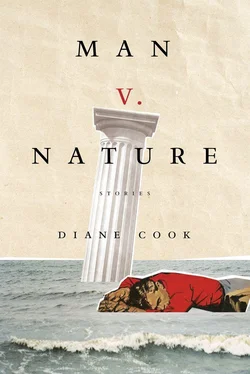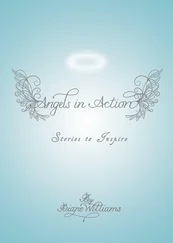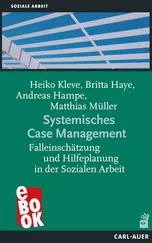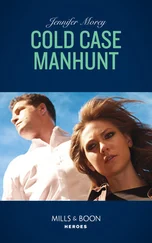We don’t have a rule for this, Alfred continues. And we’re hungry. He stretches. I’m very perplexed, he says, though his voice is flat and does not sound perplexed at all. I’ll fetch water.
When he’s gone, I scoot toward Carl. What happened? I ask him.
I ran into a log.
You didn’t see it?
It wasn’t there to be seen. It swung out of nowhere.
I made it through fine, I say skeptically.
I know.
Do you think it was a trick?
Don’t you?
But he carried you out.
I know. I know. Carl bites his lip, glances around the camp. He leans closer and whispers, We need to stop playing these games right now.
I’m quiet for a minute, then say, It was nice of Alfred to help you. He didn’t have to. If we had a rule for what’s happened, I think that rule would say that you lost. I think it’s only fair to look at this as your loss. If there were any boys left, I know they’d agree.
Carl’s mouth gapes open, hollow like a stomach.
Just then, Alfred returns with the water, and a crown of dead grass and baked mud that must have taken him a few days to make.
Between Carl and me sits the stone. As we’d whispered, we’d each unknowingly rested a hand on it. I slowly slide mine off.
Carl, you’re playing the stone? I exclaim.
He looks at his hand, then at me, rolly-eyed.
Oh, Alfred says, like he’s surprised. He presents the pebble, plucked from under Carl’s ice obstacle. It is a speckled, mineral white. I was going to give this to you, for you to win, he says to Carl, who jerks his hand from the stone like he has been burned. But you know the rules. Once you play the stone…
Carl sputters and squeals and claws at the frozen earth, trying to drag himself away.
Alfred picks up the stone. It looks small in his meaty hands, but dead-dropped, it will crush a boy.
The days grow longer, and wherever we step, water squishes and pools. The river groans as planes of ice break apart and slide over it. The breeze carries the mustiness of freed pollen, mud, green things. I know spring is near. But still the world freezes deeply each night while we sleep, and we wake dusted with snow, and nothing stirs but the wind and the trees and me and Alfred.
One cold dawn Alfred eyes me.
I’m hungry, he says. It’s just us.
We still have bones about, I say, getting the pot ready for boiling. I can make a broth.
I’m not hungry for broth, he says flatly.
Well, soon we’ll be able to hunt. I can feel it. I can hear the thaw. Yesterday morning I heard seven kinds of warbler. And the river is beginning to run again. Have you noticed? In the gaps between the ice, it looks like black silk rippling. I would have kept talking nonsense forever to get him to stop eyeing me.
But I’m hungry now.
I can wait, I say. I can wait for spring.
He stretches out his arms — they are veined and muscled — and yawns, bleary-eyed, bored. What shall we play?
I don’t answer.
Alfred smiles. I’m partial to tag. I’ll be the tagger first.
What are the rules?
When I tag you, I win.
But how do I win?
You don’t get tagged. Alfred strains to rise, as if he’s having trouble in his own body. But once standing, he seems taller, stouter than before.
Of course, I had imagined this moment coming. With just two of us left, we could become partners, brothers, or we could carry on as we had.
I don’t have time or choice; I run. I am nimbler. I tell myself I can keep ahead. I always have.
Behind me his footfalls are like the cracks of an ax against a tree, chopping it down.
We run for a long time, deep into the forest, then loop back around. I glance continually over my shoulder, expecting him to be far back, but he’s always right behind me.
We’re evenly matched, I yell, though I have always easily beaten him. Perhaps we should call a truce.
No, Alfred yells.
We splash mud everywhere. I feel the warmth release from it. With every breath I smell green.
Why are we running? I yell again. It’s so clearly spring. I’m running past the shoots of new plants piercing the snow, seeking the sun. They know .
I’m running because you’re running, Alfred says.
If you stop chasing me, I’ll dig up some bulbs and make us a hearty soup.
Alfred growls, I don’t want bulb soup.
We continue all day and through the night. I tear small branches as I go, gnaw them and suck their green, bitter sugar. I’m not sure I can carry on. But then I carry on.
As dawn breaks, I can’t feel my legs. When I don’t think I can take another step, I yell, I’ll make you a deal. I’ll find all your food for you. I’ll do everything. Just stop chasing me.
You’ll fail.
I won’t fail, because in the end I always have myself to give. If I can’t provide, I’ll be the meal.
We are thumping along the river, which now runs swift, the ice sheets breached over rocks. The rising sun turns the black world blue. I don’t hear his breath so harsh behind me anymore, but I feel a new chill, like his hands are right at my neck.
And that’s when I hear shouting, laughter, commotion far off. I am stunned, forget everything and stop. Alfred whizzes right by me through the thicket and disappears into the trees.
I hear his unmistakable voice, familiar and clear, like a brother among the stranger tones, the high and light calls of boys newly spit from the Chute: This way! A camp! I’ve found a camp!
The ruckus quickens and moves, whipped to action. I circle back and slip quietly into the clearing just as the boys tumble in and their eyes adjust; they are truly seeing one another for the first time.
I clear my throat, feign wonder: Do you think we’re the first boys to escape the Chute?
We can’t be, a small boy insists.
We must be, Alfred says. Otherwise there would be a whole community here of boys like us. But older.
This is when the boys understand that they’re here for good. They get quiet, excited, scared.
Above their heads the sun crests the dark trees, and Alfred smiles at me through the flickery orange light.
Thanks and gratitude:
For early and late reads, edits, inspiring actions, advice, excitement, or just in general: Karolina Walawiak, Jonathan Goldstein, Alissa Shipp, Lisa Pollak, Starlee Kine, Ira Glass, Julie Snyder, Jane Marie, Sarah Jetzon, Anjali Goswami, Jamie York, Rebecca Wright, Aric Knuth, Laura Wetherington, Hannah Ensor, the Just Family, Don Cook, Ramon Isao, Megan Lynch, Emily Miller, Cheryl Tan, Daniel Pipski, Heidi Julavits. Special thanks to Sam Lipsyte, Rebecca Curtis, Ben Marcus, and the excellent members of their workshops at Columbia, who saw early drafts of a few of these stories and were always encouraging, excitable, sharp. Biggest thanks to my Writing Group for all the reasons above and more: Jessamine Chan, Yael Korman, Hilary Leichter, Heather Monley, Mary South, and Lee Ellis (emeritus): Writing Group!
For time, space, support, community: Yaddo, the Albee Foundation, the Vermont Studio Center. Special gratitude to the Sitka Center for Art and Ecology, where I plumbed the big ideas and inspirations that shaped this book.
For journal encouragment, inclusion, and making-it-better edits: Meakin Armstrong, Cathy Chung, Case Kerns, Annie Liontas, Christopher Cox, Michael Ray, Rob Spillman, Meg Storey, Sigrid Rausing. Thanks to the University of Louisville Creative Writing program and Rick Simmons for championing the Calvino Prize.
To the New England Literature Program staff and students for helping me build foundations under these air castles.
To my agent, Seth Fishman, for guidance, enthusiasm, wisdom, and calm. To my editor, Terry Karten, for soulful reads and patience. And to the entire hardworking Harper team.
Читать дальше












